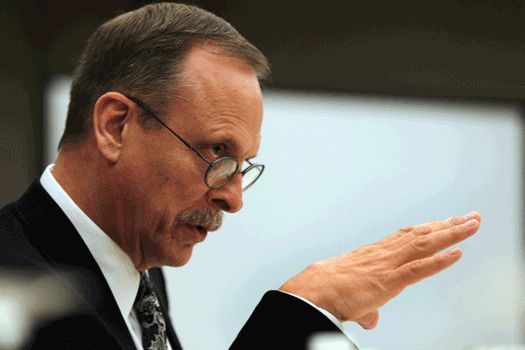By Andrew Warshaw in Doha
February 24 – Fresh details have emerged over the imminent departure from FIFA of its head of security Chris Eaton (pictured), arguably the most important figurehead in the fight against match fixing.
Eaton is quitting his high-profile role in May to join the Qatar-based International Centre for Sport Security (ICSS), a massive coup for an organisation set up only last September but already becoming increasingly influential.
Eaton’s decision will have brought huge disappointment to FIFA given the shakeup instigated by the no-nonsense Australian and his tireless campaign to weed out the perpetrators.
But with the criminals frequently finding ways to circumvent FIFA’s network of investigators, Eaton, who used to work for Interpol, is moving on and widening his brief to help sports events and federations with all aspects of safety and security.
The man behind persuading Eaton to exchange world football’s governing body for the smaller, more event-specific and elitist ICSS was Helmut Spahn, its executive director who was head of security for the 2006 World Cup in Germany.
Spahn insists things were done properly and that it was not a case of Eaton breaking his FIFA contract, to use footballing parlance.

In an interview with insideworldfootball at ICSS’s headquarters here, Spahn (pictured) said: “We have been talking to FIFA and explained the situation.
“There has been no criticism of us from FIFA.
“It was the same situation with me and the German Football Federation (DFB).
“There were a lot of projects I had implemented for them and when I talked to my President he said: ‘But Helmut, there is no one to replace you.’
“So I said: ‘I will help you find another guy,’ which I did.
“In the same way, Chris will help FIFA to find his own replacement.
“I was in close contact with Chris for many months.
“He was at our inaugural conference last year and we started communicating to see how we could work together.
“That was the start.
“He is highly respected.
“You need as good person, a team player who can work with our other directors.
“Chris has a great network all over the world and great experience in this field.
“From our point of view, we are saving ourselves time by bringing in that knowledge.
“One of his biggest motivations was that, while he was working for FIFA on the problems of match fixing in football, we are an international centre for sports security so Chris can bring his experience to bear in other fields of sports too.”
Such is the quality of personnel being recruited by the ICSS, so far only 30-strong, that they have already, said Spahn, started talking to Brazil about assisting with safety and security at the 2014 World Cup and with Rio about the 2016 Olympics.
And there has also been contact with the Egyptian authorities following the recent Port Said disaster in which over 70 fans lost their lives.
Spahn revealed the ICSS had been invited to Egypt for informal talks.
“It’s not possible to say the reason was this, this and this,” said Spahn.
“You have to sit together and assess what really happened.
“Hopefully we will be doing that.”
Contact the writer of this story at zib.l1745188007labto1745188007ofdlr1745188007owedi1745188007sni@w1745188007ahsra1745188007w.wer1745188007dna1745188007
Related stories
February 2012: Football corruption specialist Chris Eaton to leave FIFA for ICSS
January 2012: Players have been killed, admits FIFA’s head of security as war against match fixing continues
January 2012: The scale of the match fixing problem is frightening, warns FIFA’s head of security
December 2011: Gold Cup matches may have been fixed, warns FIFA security chief
October 2011: FIFA’s head of security continues to encourage whistleblowers with rewards

